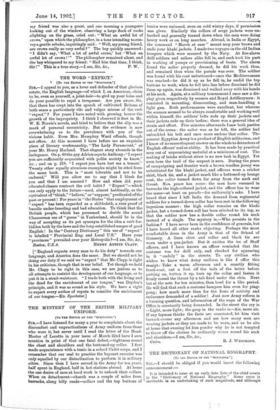THE WORD "EXPECT."
• [To THE EDITOR OE THE "SPECTATOR."]
appeal to you, as a lover and defender of that glorious estate, the English language—of which I, an American, claim to be, even as yourself, a joint-heir—to gird up your loins and do your possible to repel a trespasser. Are you aware, Sir, that there has crept into the speech of cultivated Britons of
both sexes a particularly vile and vulgar misuse of the verb " expect" P For years I have noted with growing horror the growth of the impropriety. I think I observed it first in Mr. W. E. Norris's novels, and tried to believe that the slip was a mark of personal eccentricity. But the evidence is now overwhelming ER to the prevalence with you of the vicious habit. Even Mrs. Humphry Ward offends, though not often. At this moment I have before me an exquisite piece of literary workmanship, "The Lady Paramount," of your Mr. Henry Harland. That elegant story abounds in the inelegance. On p. 60 the gay Adrian says to Anthony: "I expect you are sufficiently acquainted with polite society to know," do.; and on p. 218, "I expect you have lost me a tenant." Twenty other equally atrocious examples might be cited from the same book. This is "most tolerable and not to be endured." Will you allow me to say that I blush for you and that I am amazed ? How and when did your educated classes contract the evil habit ? " Expect "—which can only apply to the future—used, almost habitually, as the equivalent of "think," "believe," or" suppose," predicated of the past or present ! For years in "the States "that employment of "
expect" has been regarded as a shibboleth, a sure proof of bucolic under-breeding and bad education. To think that the British people, which has presumed to deride the sound Chaucerean use of " guess " in Yankeeland, should be in the -way of accepting as its pet synonym for the idea a verb for- bidden both by the laws and the long-established usages of good English ! In the" Century Dictionary" this use of " expect " is labelled" Provincial Eng. and Local U.S." Have your " provinces" prevailed over your Metropolis P—I am, Sir, &c.,
E" England expects every man to do his duty" towards our language, and America does the same. But we should not be doing our duty if we said we " expect " that Mr. Clapp is right in his criticism, though that is our belief. Yet though we hold Mr. Clapp to be right in this case, we are jealous as to all attempts to restrict the development of our language, or to put it in a strait-waistcoat. "I trade both with the living and the dead for the enrichment of our tongue," was Dryden's principle, and it was as sound as his style. We have a right to expect every author of repute to consider the enrichment of our tongue.—En. Spectator.]










































 Previous page
Previous page